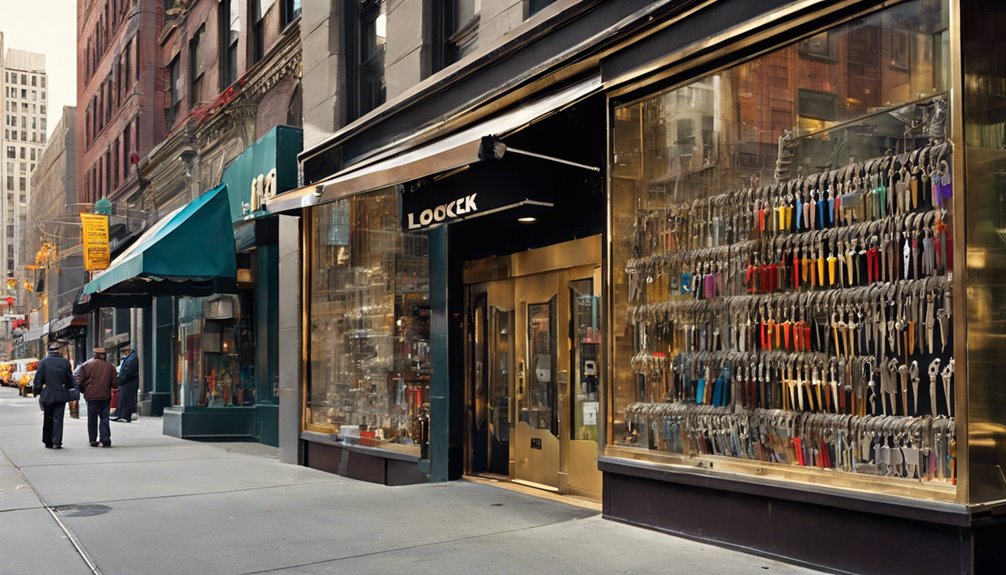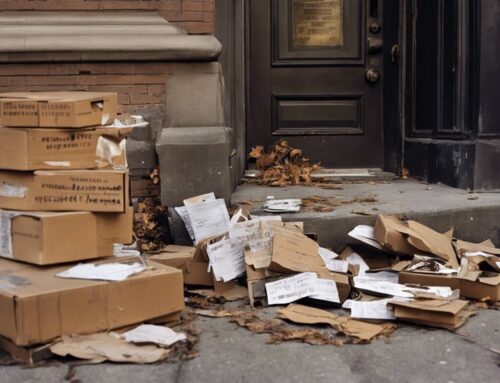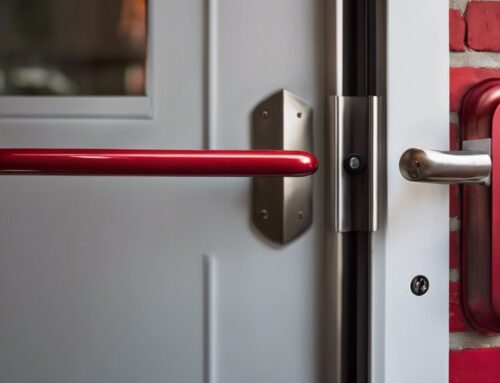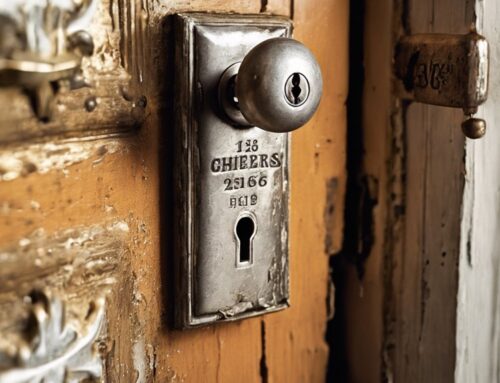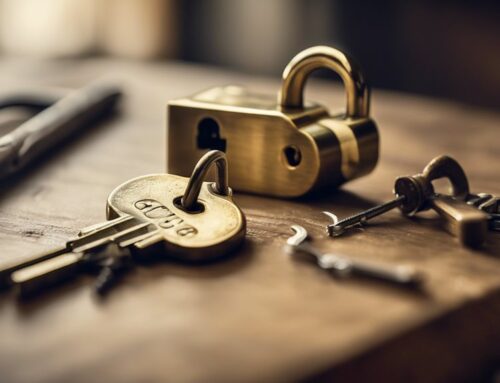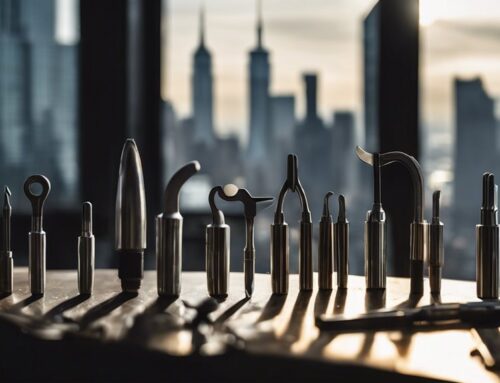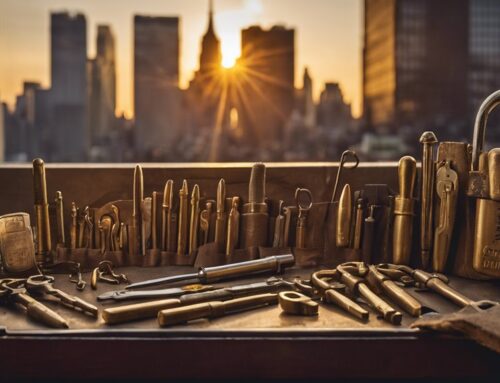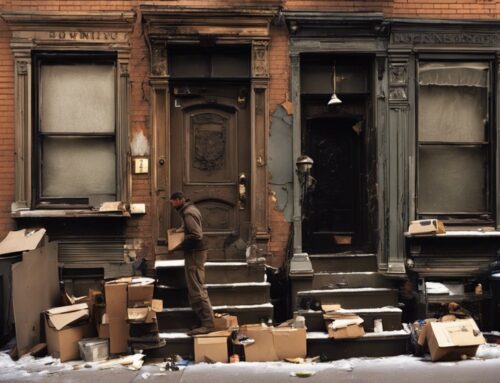Understanding regulations, adhering to licensing requirements, and managing your tools are essential for locksmiths maneuvering New York's lock picking laws. If you're a locksmith seeking to operate within the legal framework, you need to grasp the nuances of these regulations. From consent requirements to the potential ramifications of misusing tools, there are multiple layers to evaluate. You'll find that maintaining compliance not only protects you but also elevates your professional reputation. What specific aspects of these laws should you focus on to confirm you're fully informed?
Key Takeaways
- Ownership of lock picking tools is lawful for licensed locksmiths but requires intent for legal use.
- Consent from property owners is essential before accessing a lock; unauthorized access may result in penalties.
- Possessing lock picking tools without lawful intent is illegal; personal use is limited to owned locks or with permission.
- Locksmiths must maintain comprehensive service records, documenting transactions and client interactions for at least eighteen months.
- Compliance with inventory regulations and proper disposal methods for equipment is crucial to avoid fines or legal repercussions.
Licensing Requirements for Locksmiths

When you consider becoming a locksmith in New York City, it's important to understand that licensing is a crucial aspect of the profession. Unlike the broader state of New York, New York City mandates specific licensing through the Department of Consumer and Worker Protection (DCWP). This requirement is solely for NYC, emphasizing the city's commitment to regulating locksmith services.
To become licensed, you must first enroll in an accredited locksmithing program to obtain a certificate. Acceptable institutions include the Charles Stuart School and New York City College of Technology. Alternatively, undertaking an apprenticeship with a licensed locksmith can also fulfill qualification criteria. You'll then need to submit proof of your qualifications along with your application. Additionally, it's important to choose a program that helps you acquire the practical skills necessary for success in the field. Understanding employment laws that affect locksmiths can also aid your navigation through the licensing process.
The application process requires you to fill out the Individual Licensing Application online or in-person. You'll have to gather essential documents, providing a valid photo ID, a passport-sized photo, and proof of your locksmithing education.
Don't forget, fingerprinting is mandatory, contributing to a thorough background check. The fees are structured based on your application's validity, ranging up to $100. Additionally, you may find it beneficial to explore the educational programs available for enhancing your skills further as part of your career development.
Be aware that certain criminal histories may disqualify you, though the DCWP considers the nature of past offenses. The processing of your application isn't automatic and adherence to requirements is paramount.
Ultimately, your license reflects your professionalism and dedication to ensuring safety in your community as a locksmith. Embrace this process as a pathway to greater freedom in your chosen career.
Legal Use of Lock Picking Tools

Lock picking tools hold a unique legal status in New York, where their ownership and use hinge on clear stipulations. You can legally own these tools, provided you utilize them for lawful purposes. This ownership is primarily permitted for locksmiths, law enforcement personnel, and individuals who've explicit permission from property owners. Additionally, it's essential to understand that lock bumping laws are similarly regulated and should be adhered to.
Intent is critical here; if you're aiming to use the tools unlawfully, it notably alters the legality of their possession. For locksmiths and law enforcement, using these tools aligns with authorized duties, fundamental for performing your tasks effectively.
When you possess or use lock picking tools, verify you have consent from the property owner and that you're operating within the boundaries of ethical practice. Unauthorized access to someone else's property can lead to severe legal penalties. It is essential to understand that possession of lock picking tools for unlawful intent is illegal in New York, making it vital to recognize the intent behind your actions.
It's also important to note that possession combined with intent to commit a crime forms a basis for criminal charges, such as criminal possession of burglar's tools. Engaging in lock picking without the property owner's permission isn't just frowned upon; it's a criminal offense.
Violating these laws can result in fines, potential imprisonment, and a range of penalties depending on your prior record. Understanding your rights and responsibilities regarding the use of lock picking tools is fundamental. Stay informed, act ethically, and always prioritize obtaining permission to avoid the pitfalls of illegal usage.
Regulations for Locksmith Services

To operate legally in New York, you must adhere to strict licensing compliance requirements set by the DCWP. This includes maintaining accurate service records that detail client interactions and jobs performed. Failing to meet these regulations not only jeopardizes your license but could also result in significant legal repercussions. Additionally, having a valid license is crucial for establishing trust with clients and ensuring compliance with local laws. Therefore, understanding legal risks associated with locksmith services is essential for avoiding penalties and protecting your business. Operating without a license can lead to severe consequences, including legal repercussions such as fines and penalties that could impact your business significantly.
Licensing Compliance Requirements
Understanding the licensing compliance requirements for locksmith services in New York is vital for anyone looking to operate legally in this field. To obtain a locksmith license, you'll need to follow a structured process:
| Step | Requirements | Notes |
|---|---|---|
| 1. Enroll | Accredited locksmithing program | Certificate needed |
| 2. Apply | Fill out the Individual Licensing Application | Online or in-person |
| 3. Document Submission | Photo ID, passport photo, locksmith certificate, fingerprints, fee | $75 fingerprint fee |
| 4. Background Check | Pass a criminal background check | Required for approval |
Additionally, locksmiths must be aware that changing locks after eviction requires adherence to specific legal procedures outlined by the state. Additional qualifications include recommendation letters from licensed locksmiths or union verification of course completion. Remember, only licensed locksmiths can legally perform specific services, and verifying ownership before service is vital to prevent unauthorized access. Additionally, locksmiths involved in evictions must adhere to their legal responsibilities to ensure they fulfill their duties ethically and professionally.
Operating without the proper license isn't just illegal; it can lead to significant penalties, including fines and potential imprisonment. Prioritize compliance to guarantee you're not only operating freely but also responsibly in this vital profession. Stay informed and maintain your qualifications to navigate New York's locksmith regulations successfully.
Service Record Keeping
Maintaining meticulous service records is essential for licensed locksmiths in New York, as it guarantees compliance with state regulations and protects both the locksmith and their clients. It is also important for locksmiths to understand their obligations regarding tenant and landlord laws, as these can influence service requests.
You must keep a detailed log that includes the name and address of anyone ordering master keys, the time of service, and the identification means used to verify ownership. This documentation needs to be accessible for inspection by authorized personnel, ensuring transparency in your operations.
To conduct your services responsibly, obtain two forms of ID from clients—preferably a photo ID. Document their names, addresses, and phone numbers alongside your verification of their ownership or authorization to access the locked item.
Record clear service details, including the item's location and the customer's relationship to the owner.
Retention of this information is critical; keep original forms in a secured binder for at least eighteen months.
As a locksmith, keeping these records not only meets regulatory requirements but also fosters trust with your clients. By maintaining organized records, you empower your business and reflect a commitment to ethical practices in every service you provide. Additionally, understanding the legal responsibilities of master key systems is crucial for ensuring that both locksmiths and clients remain protected under New York law.
Equipment and Key Management
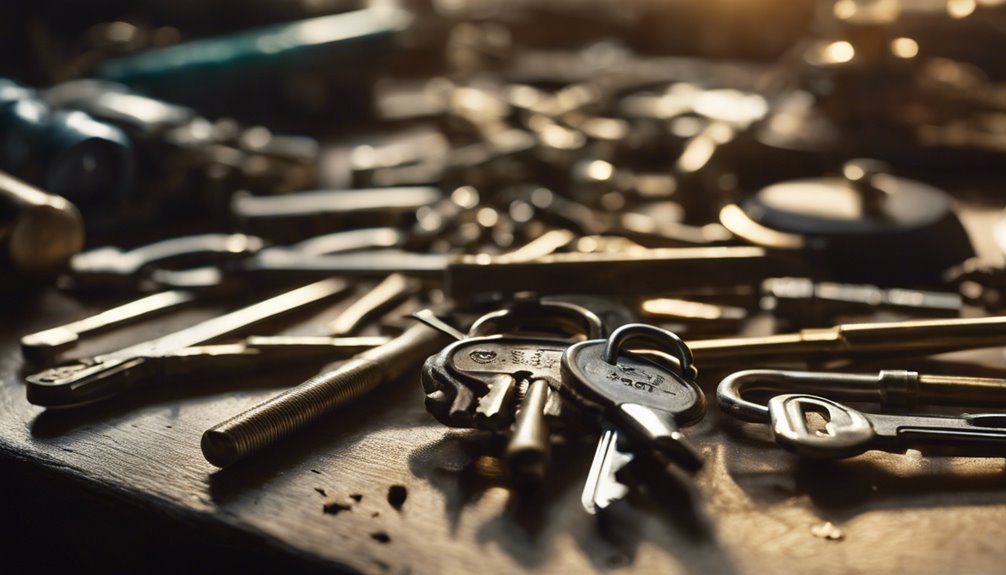
When managing your locksmithing equipment, you must guarantee strict adherence to inventory requirements and key marking protocols to comply with state laws. Accurate recordkeeping is essential, as it provides a transparent account of your transactions and protects against unauthorized access. Additionally, be prepared for inspections, as authorized personnel may review your records and equipment at any time. Furthermore, it is important to understand ethical standards that dictate how locksmiths should conduct their business to maintain public trust.
Equipment Inventory Requirements
While managing lock-picking equipment, manufacturers and jobbers must comply with strict inventory requirements imposed by New York law. You're required to file a thorough list of your equipment with both the department and the police department. This list needs to detail all master key blanks, code books, machinery, skeleton keys, key sets for automobiles, and vibrating lockpickers, among others. Remember, disposing of such equipment to any unlicensed person is unlawful, including items like pressure keys.
Here's a quick reference table to guarantee compliance:
| Requirement | Details |
|---|---|
| Equipment to be Listed | Master key blanks, code books, skeleton keys |
| Disposal Restrictions | Only to licensed locksmiths |
| Update Frequency | As required by regulations |
| Consequences of Violations | Fines and potential criminal charges |
| Authority for Enforcement | Department and police department |
Adhering to these inventory requirements isn't just legal; it's fundamental in maintaining the integrity and professionalism of your trade. Stay informed and compliant to avoid penalties and guarantee a smooth operation.
Key Marking Protocols
Effective management of lock-picking equipment naturally leads to the importance of key marking protocols that uphold security and accountability.
To protect your work and clients, all keys must be labeled with your name, address, or license number. Specifically, master keys should be distinctly marked as "master" to guarantee clarity in their use. Using blind codes enhances security by preventing unauthorized duplication while maintaining accountability.
Avoid arbitrary symbols; a consistent marking system increases readability and reliability across your operations.
Key issuance should be tightly controlled. Only authorized personnel should access keys, and you must document each issuance meticulously, ideally on company letterhead. This includes governing who can authorize keys and how they should be treated.
It's essential that every key assigned is tracked at all times, noting who's it, what it opens, and when it returns.
Furthermore, for areas with limited access, utilize locks featuring patent-protected blanks, reinforcing protection against unauthorized duplication.
Keep key markings discreet to prevent revealing their specific functions to outsiders. Implementing these protocols will fortify your operational integrity and safeguard both personal and business interests.
Recordkeeping and Inspections
Proper recordkeeping and inspections are essential for maintaining compliance with New York's locksmithing laws. As a licensed locksmith, you must meticulously document every transaction in a dedicated logbook. This should include the name and address of each person ordering master keys or requesting access to locked items, along with the date and time the work was performed.
Don't forget to record how you verified ownership or authorization, as this documentation is critical. Your logbook must be accessible for inspection by authorized personnel, which includes police officers and judges. Inspections can happen at any time, so it's imperative to stay prepared. Failing to comply with inspection requests could lead to significant penalties.
In addition to transaction records, you need to manage your equipment effectively. File a list of your locksmith tools with the appropriate authorities and remember that you can only dispose of this equipment to other licensed locksmiths.
Retaining original copies of completed forms for 18 months is also mandatory; this guarantees proper documentation in case of audits. Following these guidelines not only helps maintain your professional integrity but also protects your freedom to operate in this essential trade.
Prohibitions and Exemptions
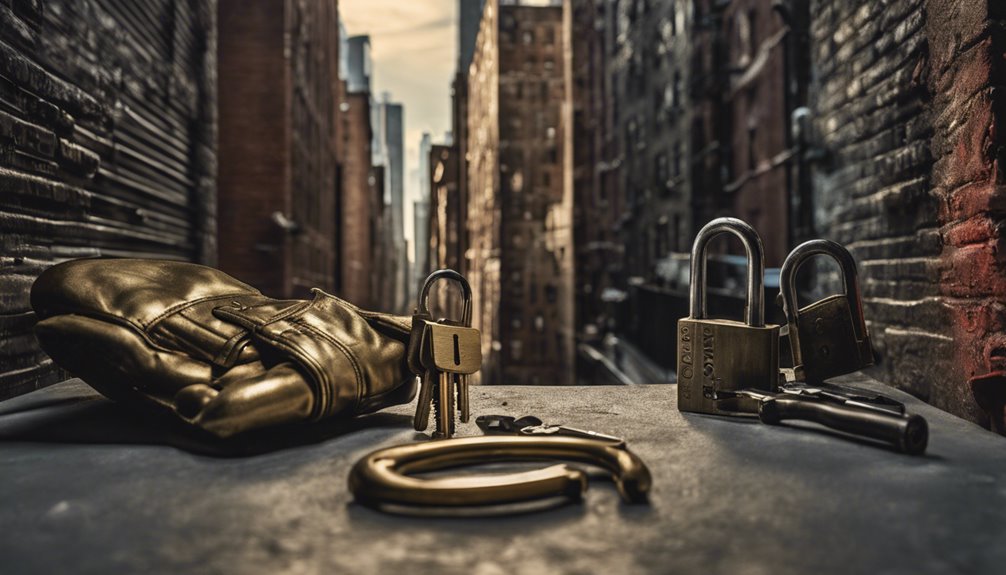
In New York, the laws surrounding lock picking tools clearly outline the prohibitions and exemptions that govern their use. Understanding these regulations is essential, especially if you want to avoid legal repercussions.
Possession of lock picking tools with unlawful intent is illegal; this includes using them to gain unauthorized access to property. Carrying these tools without valid reason can lead to severe consequences, including charges that may range from misdemeanors to felonies.
Key points to be aware of include:
- Unauthorized access to homes, vehicles, or any secured space using lock picking tools is illegal.
- Accessing locks without the property owner's explicit permission is prohibited.
- Only licensed locksmiths and law enforcement can access or use lock picking tools legally.
- Personal use of lock picking tools is restricted to locks you own or have explicit permission to access.
- Educational or training use of these tools is allowed with proper authorization.
Exemptions exist primarily for locksmiths and law enforcement personnel. Licensed locksmiths can lawfully use lock picking tools as part of their services, provided they comply with state licensing requirements.
Such individuals must also demonstrate their qualifications and pass regulatory assessments. This structure aims to maintain security and property rights while allowing professionals the means to perform their duties legally.
Understanding these prohibitions and exemptions empowers you to navigate New York's laws effectively and responsibly.
Criminal Background Checks
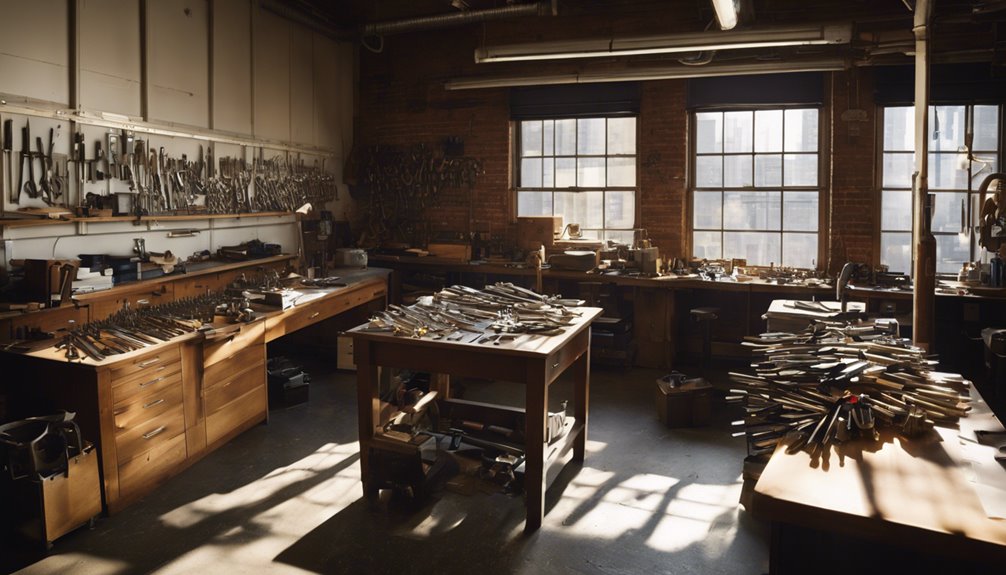
While applying for a locksmith license in New York, you'll encounter stringent requirements for criminal background checks that are crucial for determining your eligibility. The process involves in-person fingerprinting and an extensive evaluation of your criminal history.
You'll need to visit the DCA Licensing Center located at 42 Broadway, New York, NY 10004, during office hours (9:00 AM to 5:00 PM). The fingerprinting incurs a processing fee of $75. Make sure you're prepared with the necessary documentation, as various fees may be involved in the background check process.
Here's a quick overview of the requirements related to criminal background checks:
| Requirement | Details |
|---|---|
| Fingerprinting Location | DCA Licensing Center, 42 Broadway, NY |
| Processing Fee | $75 |
| Criminal History Check | Includes state and federal records |
| Disqualification Criteria | Serious offenses, prior denials, or false claims |
Your background check will assess both state and federal records, including potential connections to terrorism lists. The review considers various factors, such as the seriousness of any offenses and the time elapsed since those incidents, alongside your current age.
Navigating these requirements might feel overwhelming, but adherence is crucial to securing your locksmith license in New York. Understand the background check process thoroughly, as it can greatly influence your eligibility and the path to your desired profession.
Qualifications for Locksmith Licensing
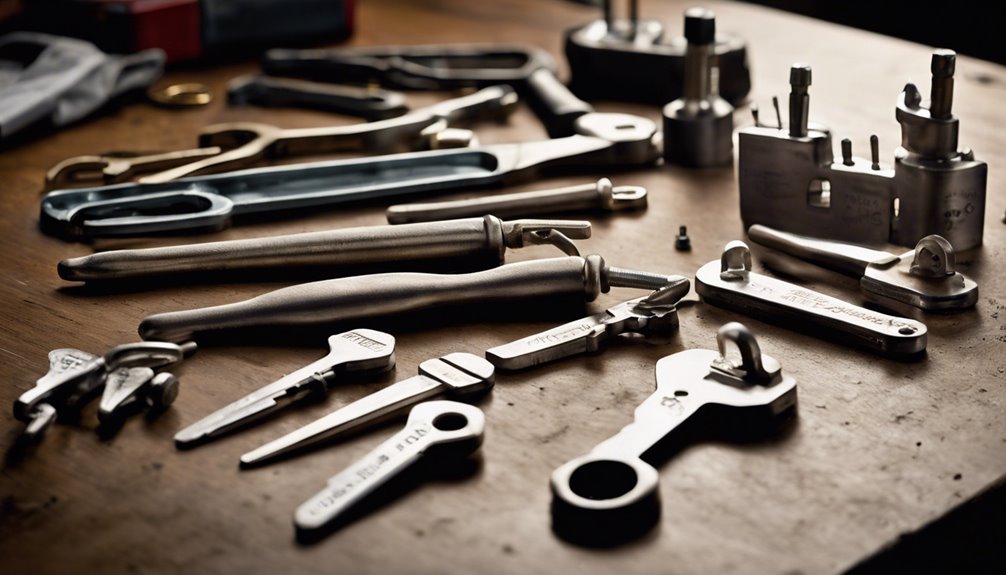
To qualify for locksmith licensing in New York, you must meet specific educational and training requirements designed to guarantee proficiency in the field.
It's crucial to enroll in an accredited locksmithing program, which can be found at institutions like the Charles Stuart School and City Tech College. A thorough course, such as the 90-hour Locksmith Certificate Program, will adequately equip you with the skills needed.
Here are key qualifications you should consider:
- Completion of 8,000 hours in an apprenticeship, covering various lock types and keyless entry systems.
- Submission of two Certificates recommending your application, signed by licensed locksmiths.
- Alternatively, a confirmation letter from Local Union No. 74 can validate your accredited training completion.
- Acceptable documentation includes a certificate from a New York State licensed school indicating course completion.
- The application process requires a photo ID, a passport-sized photo, and proof of locksmith certification.
After meeting these initial requirements, you can apply for licensing online or at designated centers.
Remember, the documents must accompany your application for it to be considered.
Furthermore, as you advance, consider obtaining certification from the Associated Locksmiths of America (ALOA), which enhances your credentials.
Pursuing continuous education keeps you informed about industry standards and practices.
With the right preparation and dedication, you'll successfully navigate the qualifications necessary to thrive as a locksmith in New York.
Frequently Asked Questions
Can I Operate as a Locksmith Without a License?
You can't operate as a locksmith without a license in New York.
If you try, you'll face penalties of $100 per day and potential fines between $375 and $500.
Operating without a license means risking your business and reputation, as repeat violations can result in increased fines or even the revocation of any existing licenses.
To navigate the industry successfully, guarantee you comply with all licensing requirements and regulations.
It's essential for your professional freedom.
What Penalties Exist for Unlicensed Locksmith Activities?
If you're operating without a locksmith license, you could face severe penalties.
Daily fines of $100 pile up, alongside potential civil penalties for repeated offenses. A single violation costs you $375, while ongoing defaults can escalate to $500.
You might find your premises sealed if they're primarily used for unlicensed activities. The consequences are real and could lead to criminal charges, fines, or even imprisonment, threatening your freedom to operate.
Are There Age Restrictions for Becoming a Locksmith?
Yes, there are age restrictions for becoming a locksmith.
You need to be at least 18 years old to apply for a locksmith license in New York City. While some programs may have different age specifics, 18 is the minimum.
This age requirement guarantees that you're legally capable of handling responsibilities associated with locksmithing.
How Can I Verify a Locksmith's License?
You might've just met a locksmith or hired one, but how can you verify their license?
Start by visiting the NYC Department of Consumer and Worker Protection website or the Licensing Center at 42 Broadway.
Check for their qualifications—ensure they've got proof of training and a clean background check.
Don't forget to confirm their equipment complies with regulations.
Keeping yourself informed guarantees you're working with a legitimate professional who values your safety.
Can Locksmiths Work in Other States Under This License?
You can't work in other states with a New York City locksmith license, as it's not transferable.
Each state has its own licensing requirements, so you'll need to obtain a license specific to the state where you plan to work.
It's essential to research local laws to guarantee compliance and avoid legal issues.
Always check if additional certifications might be necessary to operate legally and uphold professional standards in your new location.
Conclusion
To sum up, if you're a locksmith in New York looking to dabble in the art of lock picking, make sure you've got the right licenses and permissions first—after all, breaking into someone's property without a degree in legality can lead to a quick trip behind bars. Remember, it's much more fun to pick locks only when you've got the owner's blessing. So, stay legal, stay smart, and let your tools be your trusted companions, not your ticket to a legal nightmare!

